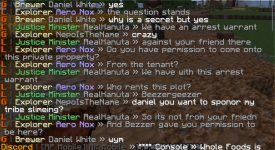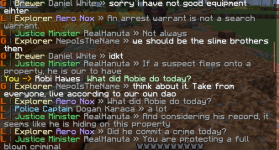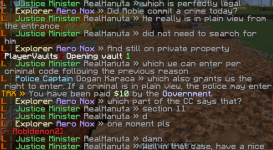- Joined
- Nov 8, 2025
- Messages
- 20
- Thread Author
- #21
Opening Statement
The MOJ has shown to completely disregard the rights of Plaintiff, we have a variety of rules for a reason they are meant to protect the fundamental constitutional rights of the individual. The MOJ by its actions has violated Plantiffs constitutional rights, I think its now time to set a precedent I will now respond to the Minister's response:
1. Agreed
2. Your Honor,
While the act does say that "The Ministry of Justice must obtain a warrant before entering or searching private property" I think its important to analyze what the intent of the language is. A warrant is the quintessential protection the individual has to overzealous government officials, and when reading this criminal code the language seems to me to be trying to achieve just that. The word that points at this the most is "searching", when looking at the constitution we see that one of the many rights given to the citizens of Azalea is the right against "unreasonable search and seizure". A warrant exists to protect said right this warrant is called a search warrant where once again we see that key word feature, "A court order authorizing law enforcement to search a specific location...". An arrest warrant would never be able to protect the citizen's constitutional right thus the existence of the search warrant, one which I think the criminal code act expressly references by its use of the word search in Section 11(d). Even looking at the caveats attached we see this theory be reinforced:
When consent has been given by the property owner or occupant.
In cases of emergency, where there is an immediate threat to life, safety, or property.
When the property is in plain view, and the search or seizure is related to a crime being committed in the presence of law enforcement.
When pursuing a suspect who has fled into the property.
When authorized by a valid court order for a specific investigation or operation.
It is abundantly clear that every single one of the conditionals are there to point at cases where a search is no longer "unreasonable", words like "pursue", "emergency", and consent all point to this fact. If the conditionals try to address this constitutional protection would it be too much to assume that the warrant in question is the one that aims to do the exact same thing?
Law enforcement has wrongly interpreted the criminal code act and has violated the rights afforded to Plaintiff by the constitution.
3. Never have I seen such an interpretation of the word private in my life, here you will find dictionary definitions
land or belongings owned by a person or group and kept for their exclusive use
-collins
something, especially land or buildings, that belongs to a particular person or company, rather than to a government:
-cambridge
Land that belongs to an individual or non-government entity who has the freedom to use, sell, mortgage, or trade it
-Justia Legal dictionary
There seems to be a pattern here, all the dictionaries agree that private property is land that belongs to an individual or non government entity. a property can be either private or public if Plaintiff was in said property because of some agreement with the individual renting it, the fact that it is private wouldn't change thus no thing such as "neutral property" exists.
4. No such thing such as "neutral property" exists, even then the CCA clearly states that "When consent has been given by the property owner or occupant." so even if the court agrees with defendants definition it is clear that the CCA takes this into account.
5. it being an "open field" is different from it being in plain view, f011 is in the middle of 3 private plots and only has a short path to it, not only that its in the middle of nowhere is defendant expecting the court to believe officer Emerald just happened to stumble upon me?.
6. The word pursue means "follow (someone or something) in order to catch or attack them", Plaintiff was not in pursuit when they were arrested this can be seen in the initial filing where at no point did the MOJ attempt to justify their entry under this premise neither Emerald or Officer Karaca ever state I was in active pursuit.
The MOJ has shown to completely disregard the rights of Plaintiff, we have a variety of rules for a reason they are meant to protect the fundamental constitutional rights of the individual. The MOJ by its actions has violated Plantiffs constitutional rights, I think its now time to set a precedent I will now respond to the Minister's response:
1. Agreed
2. Your Honor,
While the act does say that "The Ministry of Justice must obtain a warrant before entering or searching private property" I think its important to analyze what the intent of the language is. A warrant is the quintessential protection the individual has to overzealous government officials, and when reading this criminal code the language seems to me to be trying to achieve just that. The word that points at this the most is "searching", when looking at the constitution we see that one of the many rights given to the citizens of Azalea is the right against "unreasonable search and seizure". A warrant exists to protect said right this warrant is called a search warrant where once again we see that key word feature, "A court order authorizing law enforcement to search a specific location...". An arrest warrant would never be able to protect the citizen's constitutional right thus the existence of the search warrant, one which I think the criminal code act expressly references by its use of the word search in Section 11(d). Even looking at the caveats attached we see this theory be reinforced:
When consent has been given by the property owner or occupant.
In cases of emergency, where there is an immediate threat to life, safety, or property.
When the property is in plain view, and the search or seizure is related to a crime being committed in the presence of law enforcement.
When pursuing a suspect who has fled into the property.
When authorized by a valid court order for a specific investigation or operation.
It is abundantly clear that every single one of the conditionals are there to point at cases where a search is no longer "unreasonable", words like "pursue", "emergency", and consent all point to this fact. If the conditionals try to address this constitutional protection would it be too much to assume that the warrant in question is the one that aims to do the exact same thing?
Law enforcement has wrongly interpreted the criminal code act and has violated the rights afforded to Plaintiff by the constitution.
3. Never have I seen such an interpretation of the word private in my life, here you will find dictionary definitions
land or belongings owned by a person or group and kept for their exclusive use
-collins
something, especially land or buildings, that belongs to a particular person or company, rather than to a government:
-cambridge
Land that belongs to an individual or non-government entity who has the freedom to use, sell, mortgage, or trade it
-Justia Legal dictionary
There seems to be a pattern here, all the dictionaries agree that private property is land that belongs to an individual or non government entity. a property can be either private or public if Plaintiff was in said property because of some agreement with the individual renting it, the fact that it is private wouldn't change thus no thing such as "neutral property" exists.
4. No such thing such as "neutral property" exists, even then the CCA clearly states that "When consent has been given by the property owner or occupant." so even if the court agrees with defendants definition it is clear that the CCA takes this into account.
5. it being an "open field" is different from it being in plain view, f011 is in the middle of 3 private plots and only has a short path to it, not only that its in the middle of nowhere is defendant expecting the court to believe officer Emerald just happened to stumble upon me?.
6. The word pursue means "follow (someone or something) in order to catch or attack them", Plaintiff was not in pursuit when they were arrested this can be seen in the initial filing where at no point did the MOJ attempt to justify their entry under this premise neither Emerald or Officer Karaca ever state I was in active pursuit.


